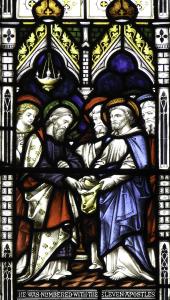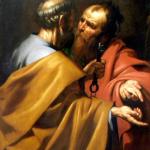Acts 1:20-26 (RSV) For it is written in the book of Psalms, `Let his habitation become desolate, and let there be no one to live in it’; and `His office let another take.’ [21] So one of the men who have accompanied us during all the time that the Lord Jesus went in and out among us, [22] beginning from the baptism of John until the day when he was taken up from us — one of these men must become with us a witness to his resurrection.” [23] And they put forward two, Joseph called Barsab’bas, who was surnamed Justus, and Matthi’as. [24] And they prayed and said, “Lord, who knowest the hearts of all men, show which one of these two thou hast chosen [25] to take the place in this ministry and apostleship from which Judas turned aside, to go to his own place.” [26] And they cast lots for them, and the lot fell on Matthi’as; and he was enrolled with the eleven apostles.
I’ve made many biblical arguments for apostolic succession (see the section on my Church web page). The above passage is central in the Catholic (as well as Orthodox and traditional Anglican) argument for that concept. I was just “hangin’ out” today and the following additional, more specific argument occurred to me (I love when that happens!).
It is, I submit, an additional argument for the infallible authority of the Church, which in turn becomes one of many biblical arguments against the man-made Protestant tradition that is its rule of faith: sola Scriptura, which denies the infallibility of Church and tradition alike and reserves it for Scripture alone.
This argument has to do with how Matthias was chosen. The time came to replace Judas as an apostle, so what did the remaining eleven original disciples / apostles do? Somehow they narrowed down the candidates to two men: Barsabbas and Matthias. So this “stage one” procedure was purely human selection, much as Catholics (through high-ranking Cardinals) vote for a pope or like how many Christian denominations hold votes for President, etc.
They then appeal directly to God, to make known His will for the person whom He “hast chosen”. It’s casually assumed that the choice has already been made by God and is a function of His providence and ultimate, supreme rule of His Church (Peter and the popes being the human rulers).
In fact, it is Peter above who initiated this process, and did so by citing Old Testament Scripture. But of course this Scripture was of no avail in actually choosing the God-ordained man for the job. That had to come from a direct word of God: an answer to prayer. Thus, in its very nature, this is an “unbiblical” procedure.
The process of choosing the “new” apostle was not achieved by applying sola Scriptura. It came, rather, through Church authority and direct guidance by God (what we call special revelation). And such divine guidance, I submit, must be infallible by its very nature (God not being able to be mistaken, in His providence and omniscience). Moreover, they didn’t simply collectively discern what they believed to be God’s answer through prayer. They cast lots, and this method selected Matthias, and was thought to reflect God’s infallible choice.
One article noted that the great Anglican evangelist John Wesley cast lots to make important decisions, and that Baptists in particular were most uncomfortable with this. Ironically, it never mentions Acts 1:26, which is the explicitly biblical basis for this practice. Once again, then, no doubt these protesting Baptists thought of themselves as “Bible only” folks, yet seem to have overlooked the relevant biblical text.
The passage above in Acts 1 doesn’t show the slightest disapproval of casting lots, through which God’s specific will would become known. Certainly if it was intrinsically wrong, the text would make note of it. Instead, we have eleven of the original disciples of Jesus, led by Peter, using this method to choose an apostle.
This is a God, after all, Who struck Uzzah dead on the spot for simply trying to prevent the ark of the covenant from falling on the ground. He reached out to steady it and was struck dead (2 Sam 6:1-7; 1 Chr 13:9-12). And in two incidents in the book of Acts, both involving St. Peter, God, or Peter speaking as a representative of Him, express divine disapproval without any ambiguity whatever.
Acts 5:1-11 tells the story of Ananias and Sapphira, who “sold a piece of property, and . . . kept back some of the proceeds, and brought only a part and laid it at the apostles’ feet” (5:1-2). St. Peter described this as a “Satan”-influenced “lie to the Holy Spirit” (5:3). Consequently, Ananias “fell down and died” (5:5), followed three hours later by his wife Sapphira (5:7, 10).
The second incident involved Simon the former sorcerer, who desired to pay money to the apostles to receive the power of being able to lay hands on people so that they could receive the Holy Spirit (8:9, 17-19). St. Peter rebuked this in no uncertain terms:
Acts 8:20-23 . . . “Your silver perish with you, because you thought you could obtain the gift of God with money! [21] You have neither part nor lot in this matter, for your heart is not right before God. [22] Repent therefore of this wickedness of yours, and pray to the Lord that, if possible, the intent of your heart may be forgiven you. [23] For I see that you are in the gall of bitterness and in the bond of iniquity.”
Both of these incidents involved false or unethical opinions or practices that were immediately judged: one of them with a judgment of death from God. Peter was central in both. Therefore, it makes no sense whatsoever to think that Peter would have missed something so inherently wrong and wicked as casting lots: if indeed this was (in God’s eyes) a wicked and impermissible thing.
Peter shows no such awareness; nor does the larger narrative of the text from Luke, who had no qualms about condemning (through the words of Peter) the improprieties of Ananias and Sapphira and Simon. The Bible never hesitates to expose sinful actions, including, famously, Peter’s own lapse (three denials of the Lord). If Peter was mistaken here, certainly the inspired Bible would make it plain that he was.
In fact, there was a long Old Testament history of approved use of the casting of lots. God Himself commanded Moses to have his brother Aaron cast lots regarding an offering to Him on the Day of Atonement (Yom Kippur):
Leviticus 16:7-10 Then he shall take the two goats, and set them before the LORD at the door of the tent of meeting; [8] and Aaron shall cast lots upon the two goats, one lot for the LORD and the other lot for Aza’zel. [9] And Aaron shall present the goat on which the lot fell for the LORD, and offer it as a sin offering; [10] but the goat on which the lot fell for Aza’zel shall be presented alive before the LORD to make atonement over it, that it may be sent away into the wilderness to Aza’zel.
Joshua divided up the Promised Land based on the use of lots:
Joshua 18:6-11 And you shall describe the land in seven divisions and bring the description here to me; and I will cast lots for you here before the LORD our God. [7] The Levites have no portion among you, for the priesthood of the LORD is their heritage; and Gad and Reuben and half the tribe of Manas’seh have received their inheritance beyond the Jordan eastward, which Moses the servant of the LORD gave them.” [8] So the men started on their way; and Joshua charged those who went to write the description of the land, saying, “Go up and down and write a description of the land, and come again to me; and I will cast lots for you here before the LORD in Shiloh.” [9] So the men went and passed up and down in the land and set down in a book a description of it by towns in seven divisions; then they came to Joshua in the camp at Shiloh, [10] and Joshua cast lots for them in Shiloh before the LORD; and there Joshua apportioned the land to the people of Israel, to each his portion. [11] The lot of the tribe of Benjamin according to its families came up, and the territory allotted to it fell between the tribe of Judah and the tribe of Joseph.
Temple duties were determined in the same manner (24 different appointments!):
1 Chronicles 24:5-8, 18-19 They organized them by lot, all alike, for there were officers of the sanctuary and officers of God among both the sons of Elea’zar and the sons of Ith’amar. [6] And the scribe Shemai’ah the son of Nethan’el, a Levite, recorded them in the presence of the king, and the princes, and Zadok the priest, and Ahim’elech the son of Abi’athar, and the heads of the fathers’ houses of the priests and of the Levites; one father’s house being chosen for Elea’zar and one chosen for Ith’amar. [7] The first lot fell to Jehoi’arib, the second to Jedai’ah, [8] the third to Harim, the fourth to Se-o’rim, . . . [18] the twenty-third to Delai’ah, the twenty-fourth to Ma-azi’ah. [19] These had as their appointed duty in their service to come into the house of the LORD according to the procedure established for them by Aaron their father, as the LORD God of Israel had commanded him.
See also:
Nehemiah 10:34 We have likewise cast lots, the priests, the Levites, and the people, for the wood offering, to bring it into the house of our God, according to our fathers’ houses, at times appointed, year by year, to burn upon the altar of the LORD our God, as it is written in the law. (cf. 11:1)
So we’re back to the bottom-line question of casting lots to determine who would replace Judas as an apostle. There are three choices in interpreting it, or so it seems to me:
1) It was intrinsically evil. The argument I just made by analogy and the examples from the Old Testament destroy this option.
2) It was sheer chance or happenstance. This is implausible because it runs contrary to the expressed desire for God’s will to be made known, and His providential control over the affairs of men. God made His will known. Technically, in Christian theology, there is no such thing as mere chance in the overall scheme of things. I’m not saying that God controls every throw of the dice in a Monopoly game, but in the “larger things” He does.
3) It was a means for God to concretely express His will as regards the question of the choice of Judas’ replacement. This option alone makes sense, all things considered.
This being the case, it is also an infallible exercise of God-guided government in the Church. The apostles exercised infallible authority through casting lots, which revealed God’s infallible will. In a similar but not totally analogous way, the apostles and elders at the council of Jerusalem exercised equally profound infallible and binding authority and issued a decree that St. Paul went around proclaiming to all and sundry to observe (Acts 16:4).
They had declared “it has seemed good to the Holy Spirit and to us” (15:28), thus invoking obviously infallible authority, as it came from the Holy Spirit, Who is God.
The choosing of Matthias is a further instance of divine infallible guidance, exercised through Church authority and authoritative persons in the Church, appointed by Jesus Himself (the remaining eleven apostles), or by these eleven (Matthias).
Anyway one looks at it, this is not a sola Scriptura rule of faith. It’s the furthest thing from it.
***
Practical Matters: Perhaps some of my 3,900+ free online articles (the most comprehensive “one-stop” Catholic apologetics site) or fifty books have helped you (by God’s grace) to decide to become Catholic or to return to the Church, or better understand some doctrines and why we believe them.
Or you may believe my work is worthy to support for the purpose of apologetics and evangelism in general. If so, please seriously consider a much-needed financial contribution. I’m always in need of more funds: especially monthly support. “The laborer is worthy of his wages” (1 Tim 5:18, NKJV). 1 December 2021 was my 20th anniversary as a full-time Catholic apologist, and February 2022 marked the 25th anniversary of my blog.
PayPal donations are the easiest: just send to my email address: [email protected]. You’ll see the term “Catholic Used Book Service”, which is my old side-business. To learn about the different methods of contributing, including 100% tax deduction, etc., see my page: About Catholic Apologist Dave Armstrong / Donation Information. Thanks a million from the bottom of my heart!
***
Photo credit: Lawrence OP (4-21-08). Stained glass from St Mary’s church in Buckland, depicting Matthias’ selection [Flickr / CC BY-NC-ND 2.0 license]
***
Summary: How the eleven apostles chose the successor of Judas, Matthias (by casting lots after asking God’s guidance) provides a fascinating argument against sola Scriptura.
***













